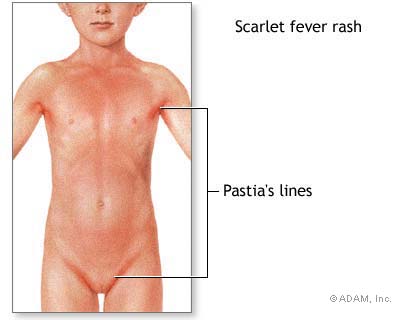Scarlet Fever

What is Scarlet Fever?
Scarlet fever, also known as scarlatina, is a bacterial illness that develops in some people who have strep throat. It's characterized by a bright red rash that covers most of the body.
Who’s at Risk for Scarlet Fever?
Scarlet fever primarily affects children between the ages of 5 and 15, though anyone can get it.
What Causes Scarlet Fever?
Scarlet fever is caused by the same bacteria that cause strep throat, Group A Streptococcus. The bacteria release toxins that produce the rash and red tongue associated with scarlet fever.
How Does Scarlet Fever Start?
Scarlet fever starts with a strep throat infection. Symptoms of the throat infection appear first, followed by the characteristic rash of scarlet fever.
What Are the Symptoms of Scarlet Fever?
Symptoms include a red rash that feels like sandpaper, red lines in the folds of skin, a flushed face, a strawberry-like appearance of the tongue, high fever, sore throat, and swollen glands.
How is Scarlet Fever Diagnosed?
Scarlet fever is usually diagnosed based on a physical exam, symptoms, and a throat swab to test for strep bacteria.
How Can Scarlet Fever Be Treated?
Scarlet fever is treated with antibiotics, which must be taken for the full course, even if symptoms subside earlier, to ensure the bacteria are fully eradicated and complications are prevented.
What Complications May Occur with Scarlet Fever?
If not treated properly, scarlet fever can lead to serious complications such as rheumatic fever (an inflammatory disease that can affect the heart, joints, skin, and brain), kidney damage, ear infections, skin infections, and pneumonia.
How Can I Prevent Scarlet Fever?
Prevention of scarlet fever involves regular hand washing, not sharing personal items like utensils, and staying away from people infected with Group A Streptococcus.
Long-term Management of Scarlet Fever
Long-term management involves completing the full course of prescribed antibiotics and follow-up visits to the doctor to ensure the infection is completely cleared.
What is Recent Research Saying About Scarlet Fever?
Recent research is exploring why scarlet fever has re-emerged in some parts of the world after decades of decline. There's also ongoing work on developing a vaccine for Group A Streptococcus infections.
Where Can I Go For More Information on Scarlet Fever?
For more information on scarlet fever, visit reputable health websites like the Centers for Disease Control and Prevention, the Mayo Clinic, or the American Academy of Pediatrics.

